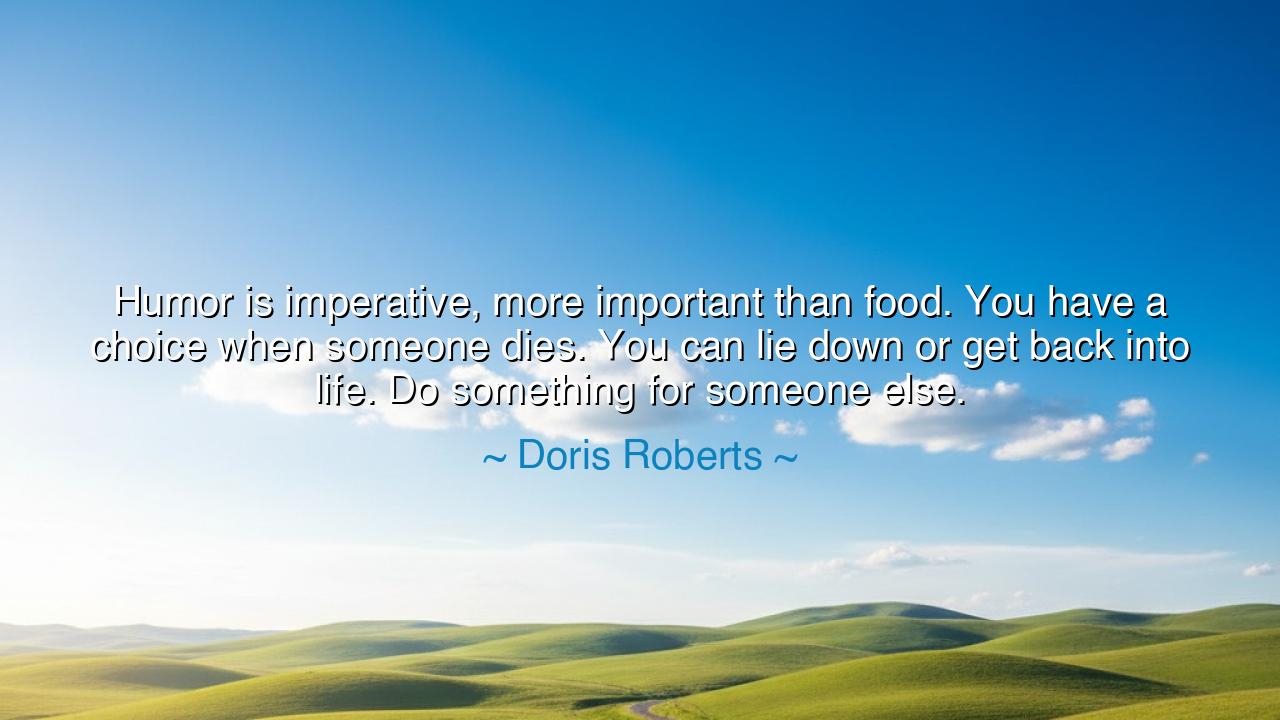
Humor is imperative, more important than food. You have a choice
Humor is imperative, more important than food. You have a choice when someone dies. You can lie down or get back into life. Do something for someone else.






The words of Doris Roberts—“Humor is imperative, more important than food. You have a choice when someone dies. You can lie down or get back into life. Do something for someone else”—ring with the wisdom of a woman who has walked through both laughter and loss and emerged with her spirit unbroken. Beneath their gentle cadence lies a truth older than time: that humor and service are not mere comforts but sacred powers, the forces that restore the human heart when sorrow has stripped it bare. Roberts speaks as one who has faced the storms of grief and discovered, in the wreckage, the two enduring lights that guide the soul back to life—laughter and compassion.
To say that humor is more important than food is not to diminish the needs of the body, but to exalt the needs of the spirit. For food sustains life only so long as one wishes to live—but humor gives one a reason to live. It is the breath of the soul when air alone is not enough. The ancients knew this truth well: Aristotle called laughter the property of humankind, the flame that separates us from beasts. To laugh is to reclaim joy from the jaws of despair; it is to say to life, You cannot defeat me. Roberts, through her art and through her grief, understood that humor is a defiant act of healing—a medicine for the invisible wounds that no physician can touch.
In her words, we also hear the solemn choice that faces every soul after tragedy: “You can lie down or get back into life.” Death, whether of a loved one, a dream, or a season of joy, leaves us at this crossroad. To “lie down” is to surrender—to allow grief to bury the living along with the dead. But to “get back into life” is to honor what was lost by continuing to create, to love, to serve. This choice is the heart of resilience, the virtue that defines heroes not of battle but of the spirit. Roberts’s teaching is simple yet profound: even in the shadow of death, life must be chosen again and again.
Consider the story of Helen Keller, who, though deaf and blind from infancy, refused to lie down before the darkness. With the help of her teacher, Anne Sullivan, she reached out into the world through touch and imagination, finding both knowledge and joy. Humor, kindness, and service became her way of living. She once said, “Although the world is full of suffering, it is also full of the overcoming of it.” This is the same truth Roberts offers—that life does not end with pain, but is renewed through connection and compassion.
When Roberts speaks of doing “something for someone else,” she gives us the key to transcendence. For grief, when held too tightly, becomes a prison; but when turned outward in service, it becomes liberation. To lift another is to lighten one’s own burden; to offer laughter is to rekindle one’s own joy. The Buddha, after achieving enlightenment, did not retreat into solitude but devoted his life to teaching others the path of peace. Likewise, Roberts’s words remind us that healing is not found in isolation but in love expressed through action. The hands that give become the heart that heals.
The origin of Roberts’s wisdom lies not in philosophy alone, but in her own life as an actress, a mother, and a survivor. Known for her roles filled with warmth and wit, she understood that laughter was more than performance—it was communion. She brought joy to others not because her life was free from pain, but because she had learned to transform that pain into light. Like the jesters of old who comforted kings, she knew that humor is divine medicine, that it can reach where reason and comfort cannot. Her laughter was not a mask for sorrow but a triumph over it.
Let this be the lesson carried forward: In grief, choose laughter; in despair, choose service. When life’s storms strike, do not lie down in their path. Stand, even trembling, and reach for others. Find humor in small things, for humor is the spark that keeps the heart alive. To laugh is not to forget pain but to rise above it; to serve is not to deny loss but to redeem it. Through these acts, we become healers not only of others but of ourselves.
So remember the teaching of Doris Roberts, a sage disguised as a comedian: Laughter is life’s second breath. Compassion is its heartbeat. When sorrow comes—as it must—meet it not with despair, but with the twin gifts of humor and kindness. For in giving joy and in doing good, you will find that death cannot silence love, nor grief extinguish the light within you.






AAdministratorAdministrator
Welcome, honored guests. Please leave a comment, we will respond soon